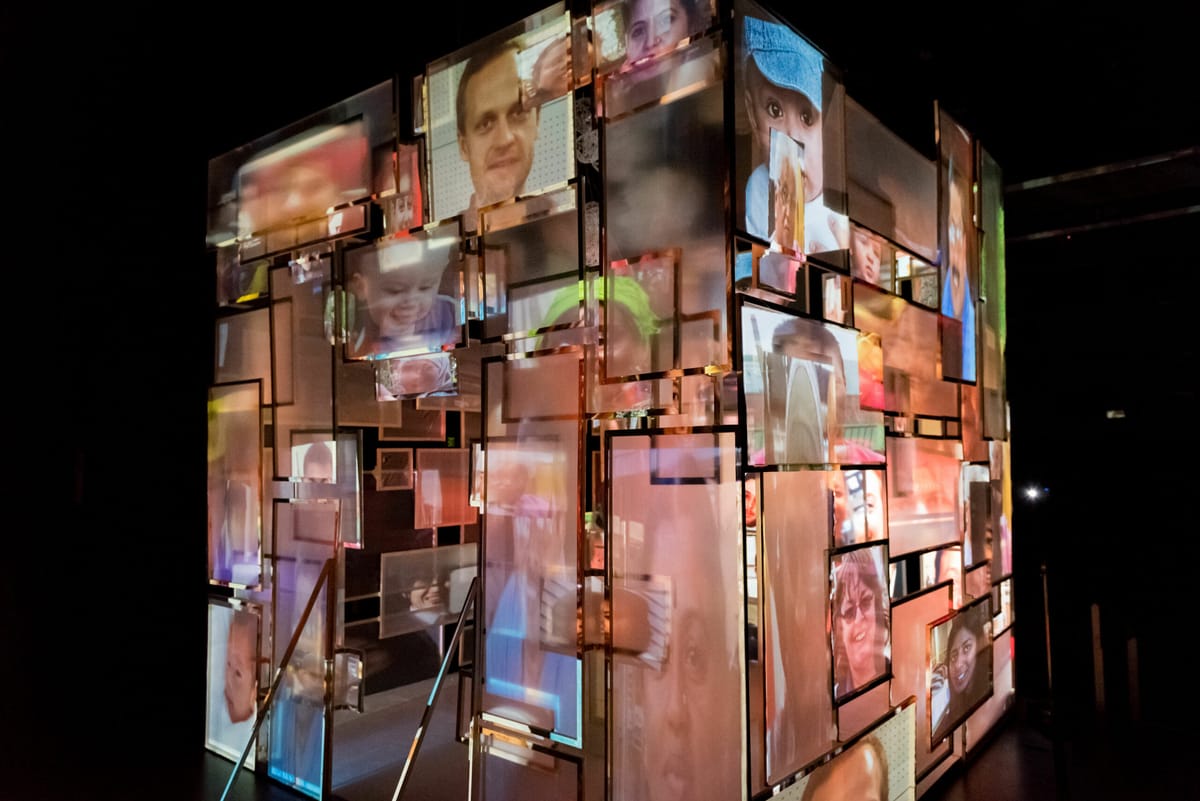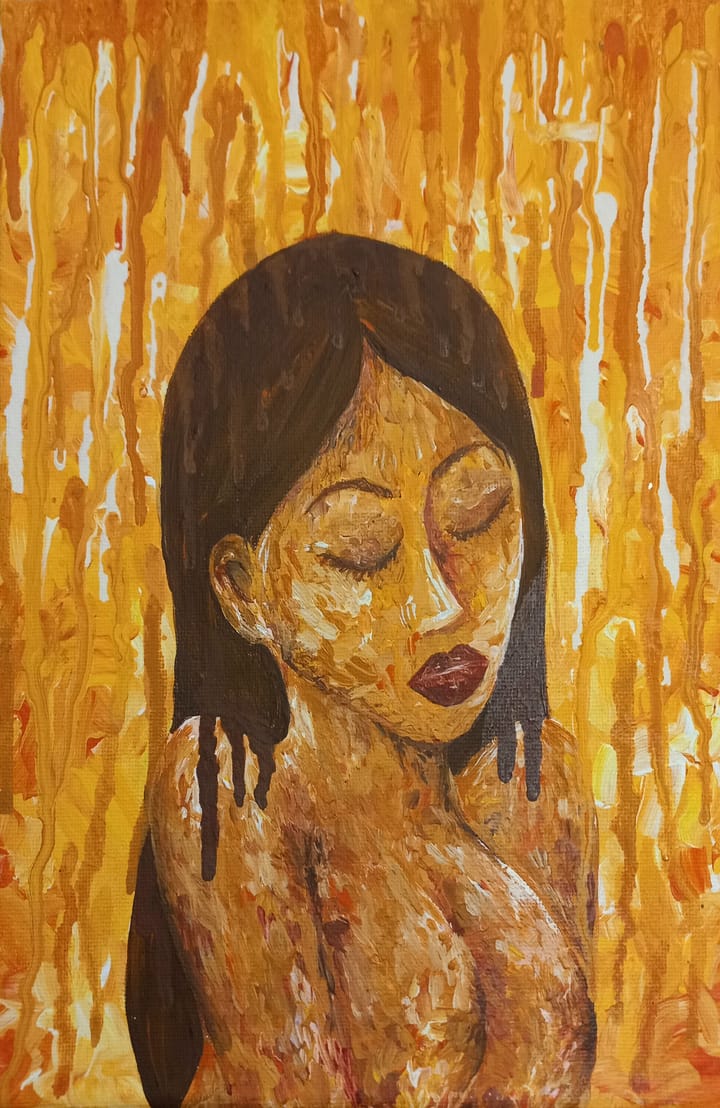Thesis Project AWAKE Inspires Thoughtful Introspection

On the evenings of April 3 through April 7, Lauren Thompson ’19 and Benjamin Kissinger ’20E were in the Kirby Memorial Theater showing their theater and dance thesis project, AWAKE, for members of the Amherst community. Described in its event page as a “multimedia work of installation art/experimental theater designed as an immersive, single-viewer experience,” AWAKE takes the physical form of a large cube.
The cube is composed of an abstract collection of various rectangular wooden panels which the viewer is invited to step into for the duration of the 25-minute immersive experience. While the project falls within the theater and dance department, the show does not include any performers or a collective audience. Instead, the narrative of life and death is told through intricate interactions of light, sound, projections and space.
One of the most striking aspects of the project is that it is meant to be experienced in isolation. “We wanted to get someone to actually think without looking to someone else, whether that’s the performer or fellow audience members,” Kissinger explained.
At the beginning of AWAKE, a single viewer is invited into the dark theater and instructed to take a seat in the back row. They are then left alone in the dark until a large cube onstage fills with multicolored light and a voice asks the viewer to walk towards the stage and enter the cube. The narrative follows the timeline of life to death and is broken into four sections: one for birth, one for childhood, one for suffering and one for death. In each section, corresponding archival footage accompanied by both a male and a female voice is projected onto panels, creating an immersive and, at times, aesthetically-overwhelming experience.
The project ends in a kind of introspective meditation as the viewer stands facing the empty theater, staring into a mathematically-generated, never-ending pattern projected on the panels in front of them. Amplified voices read from Buddhist teachings pertaining to the self, the impermanence of human life and our purpose in the world. Standing or sitting alone in the cube, the viewer inherently begins to contemplate their own mortality and place in the universe.
Kissinger and Thompson drew inspiration for their thesis from Buddhist teachings and philosophers, as well as their own experiences and those of their friends. Kissinger explained that he and Thompson “did a lot of research into Buddhism and philosophers and looked at where their messages overlapped and what they had to say about the human self; not so much about dogma, but what people are capable of when they set their mind to wholesome actions.”
“We were trying to create an experience everyone can connect to on some level,” Thompson added. “There are a lot of ideas and topics within Buddhism and philosophy that we wanted to touch on, but we ended up settling on life and death in general because that’s something that everyone goes through … And it’s really easy to get swept up in patterns that we’re caught up in, ‘the system’ if you will, and just feeling like we’re in this endless slog, working towards something and accidentally forgetting everything that’s already around us. So we wanted to pay attention to those things and remind people that life is more than some abstract end goal.”
Although the two students were set on collaborating from the beginning of the thesis process, Thompson noted that, as far as their professor could remember, no one at the college had ever done a joint thesis before. “We kind of always knew that Ben wanted to do some programming and stuff with mathematics and computer science and loops. And I was going to bring my design background to the table but we both would collaborate on the narrative, what the story was,” she elaborated.
Both Thompson and Kissinger acknowledged that the collaboration challenged them in the creative process but in the end made the final product better. “We had to learn how to feel like your ideas are being represented and there’s a cohesive whole, but also being able to give up certain things in order to make the project better,” said Thompson
In addition to being incredibly technically complicated, AWAKE was profoundly thought-provoking and emotional for many of its viewers. Wanting to hear from those who came to experience the project, Thompson and Kissinger reserved 10 minutes at the end of every showing for a talk-back in which they could share some of their inspirations and hear their audience’s reactions. They were both struck by the number of people who shared that the project fell into their lap at the perfect time in their life, in that encountering AWAKE allowed them to deeply consider their life experiences in a new light.
Kissinger was also surprised by the number of people who shared the experience of being uncomfortable with coming to the show and experiencing it alone. “That can be intense,” he said.
Reflecting back on his own time at Amherst, Kissinger believed the teachings of his project are especially salient to young people. “I think the things we were exploring reflect a lot of what I see myself going through and what a lot of my friends have gone through,”
he said. “Everyone says this is the time of your life to find yourself and personally I think that means something a little bit different. I think that means finding yourself as accepting who you are and then also understanding what the potential of a person is when you look past the everyday desires around you. It’s about what happens when you sacrifice a little bit of something and what can you do with that; how much can you create.”
Adding on, Thompson reflected, “I’m going to be leaving this school in a matter of weeks so it’s been a helpful practice in remembering these things. Watching and hearing it over and over again, night after night, it almost became like a meditation for the both of us. We walked out of it changed and just more mindful of our place in the grand scheme of things.”
Experimental in nature, AWAKE challenged and expanded general conceptions of what a thesis project could look like. Its universal message of life, death and self-reflection contains important lessons for all young adults as we navigate our individual places in the world, both at Amherst and beyond.





Comments ()